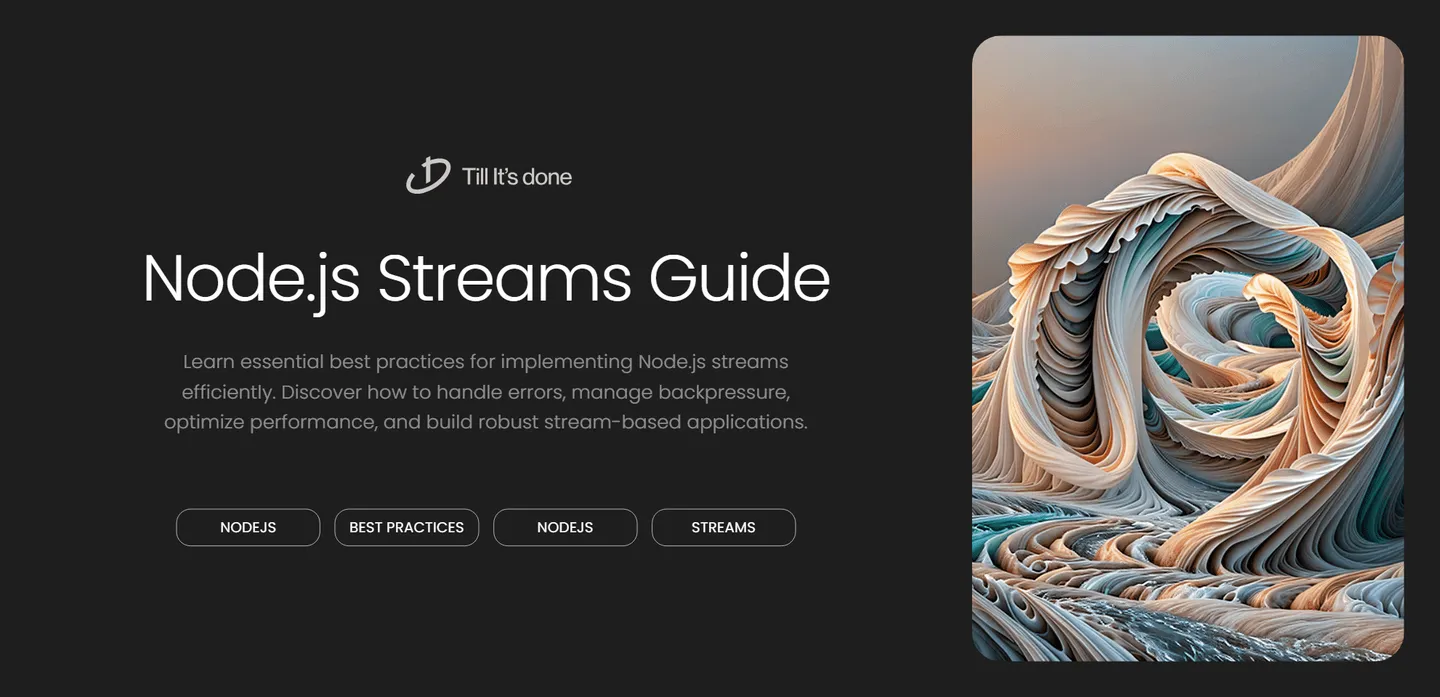- Services
- Case Studies
- Technologies
- NextJs development
- Flutter development
- NodeJs development
- ReactJs development
- About
- Contact
- Tools
- Blogs
- FAQ
Best Practices for Working with Streams in Node.js
Discover how to handle errors, manage backpressure, optimize performance, and build robust stream-based applications.

Best Practices for Working with Streams in Node.js

Streams are one of Node.js’s most powerful features, yet they can be tricky to work with if you’re not familiar with their patterns and best practices. In this guide, we’ll explore how to effectively use streams in your Node.js applications while following established best practices.
Understanding Stream Fundamentals
Before diving into best practices, let’s quickly review what makes streams so valuable. Streams allow you to handle reading or writing large amounts of data piece by piece, rather than loading everything into memory at once. This makes them perfect for handling large files, network communications, or any scenario where you’re dealing with substantial amounts of data.

Best Practices for Stream Implementation
1. Error Handling is Critical
Always handle errors in your streams. Streams are EventEmitters, and they can emit ‘error’ events at any time.
readableStream .on('error', (error) => { console.error('Error reading stream:', error); }) .pipe(writableStream) .on('error', (error) => { console.error('Error writing stream:', error); });2. Use Pipeline Instead of Pipe
The pipeline function from the stream module is preferred over the pipe method as it automatically handles error propagation and cleanup:
const { pipeline } = require('stream');
pipeline( sourceStream, transformStream, destinationStream, (err) => { if (err) { console.error('Pipeline failed:', err); } else { console.log('Pipeline succeeded'); } });3. Implement Backpressure Handling
Respect backpressure signals from your streams. When implementing a custom stream, return appropriate boolean values from the write() method:
class CustomWritable extends Writable { _write(chunk, encoding, callback) { // Process the chunk const canContinue = processChunk(chunk);
if (canContinue) { callback(); } else { // Wait until processing is done before calling callback setTimeout(callback, 100); } }}
4. Optimize Buffer Sizes
When creating transform streams, choose appropriate buffer sizes based on your use case:
const transform = new Transform({ highWaterMark: 64 * 1024, // 64KB transform(chunk, encoding, callback) { // Process the chunk callback(null, processedChunk); }});5. Clean Up Resources
Always clean up your streams when you’re done with them:
const cleanup = (stream) => { stream.removeAllListeners(); if (stream.destroy) stream.destroy();};
// Usageconst readStream = fs.createReadStream('input.txt');const writeStream = fs.createWriteStream('output.txt');
pipeline(readStream, writeStream, (err) => { cleanup(readStream); cleanup(writeStream); if (err) console.error('Transfer failed:', err);});6. Use Async Iterators for Modern Stream Processing
For modern Node.js applications, consider using async iterators to process streams:
async function processStream(readable) { for await (const chunk of readable) { // Process each chunk await processChunk(chunk); }}Conclusion
By following these best practices, you can build robust and efficient stream-based applications in Node.js. Remember that streams are powerful tools that, when used correctly, can significantly improve your application’s performance and resource utilization.

 สร้างเว็บไซต์ 1 เว็บ ต้องใช้งบเท่าไหร่? เจาะลึกทุกองค์ประกอบ website development cost อยากสร้างเว็บไซต์แต่ไม่มั่นใจในเรื่องของงบประมาณ อ่านสรุปเจาะลึกตั้งแต่ดีไซน์, ฟังก์ชัน และการดูแล พร้อมตัวอย่างงบจริงจาก Till it’s done ที่แผนชัด งบไม่บานปลายแน่นอน
สร้างเว็บไซต์ 1 เว็บ ต้องใช้งบเท่าไหร่? เจาะลึกทุกองค์ประกอบ website development cost อยากสร้างเว็บไซต์แต่ไม่มั่นใจในเรื่องของงบประมาณ อ่านสรุปเจาะลึกตั้งแต่ดีไซน์, ฟังก์ชัน และการดูแล พร้อมตัวอย่างงบจริงจาก Till it’s done ที่แผนชัด งบไม่บานปลายแน่นอน  Next.js สอน 14 ขั้นตอนเบื้องต้น: สร้างโปรเจกต์แรกใน 30 นาที เริ่มต้นกับ Next.js ใน 14 ขั้นตอนเพียงแค่ 30 นาที พร้อม SSR/SSG และ API Routes ด้วยตัวอย่างโค้ดง่าย ๆ อ่านต่อเพื่อสร้างโปรเจ็กต์แรกได้ทันทีที่นี่
Next.js สอน 14 ขั้นตอนเบื้องต้น: สร้างโปรเจกต์แรกใน 30 นาที เริ่มต้นกับ Next.js ใน 14 ขั้นตอนเพียงแค่ 30 นาที พร้อม SSR/SSG และ API Routes ด้วยตัวอย่างโค้ดง่าย ๆ อ่านต่อเพื่อสร้างโปรเจ็กต์แรกได้ทันทีที่นี่  วิธีสมัคร Apple Developer Account เพื่อนำแอปขึ้น App Store ทีละขั้นตอน อยากปล่อยแอปบน App Store ระดับโลก มาอ่านคู่มือสมัคร Apple Developer Account พร้อมเคล็ดลับ TestFlight และวิธีอัปโหลดที่ง่ายในบทความเดียวนี้ได้เลย
วิธีสมัคร Apple Developer Account เพื่อนำแอปขึ้น App Store ทีละขั้นตอน อยากปล่อยแอปบน App Store ระดับโลก มาอ่านคู่มือสมัคร Apple Developer Account พร้อมเคล็ดลับ TestFlight และวิธีอัปโหลดที่ง่ายในบทความเดียวนี้ได้เลย  TypeScript Interface คืออะไร? อธิบายพร้อมวิธีใช้และข้อแตกต่างจาก Type เรียนรู้วิธีใช้ TypeScript Interface เพื่อสร้างโครงสร้างข้อมูลที่ปลอดภัยและเข้าใจง่าย พร้อมเปรียบเทียบข้อดีข้อแตกต่างกับ Type ที่คุณต้องรู้ ถูกรวมเอาไว้ในบทความนี้แล้ว
TypeScript Interface คืออะไร? อธิบายพร้อมวิธีใช้และข้อแตกต่างจาก Type เรียนรู้วิธีใช้ TypeScript Interface เพื่อสร้างโครงสร้างข้อมูลที่ปลอดภัยและเข้าใจง่าย พร้อมเปรียบเทียบข้อดีข้อแตกต่างกับ Type ที่คุณต้องรู้ ถูกรวมเอาไว้ในบทความนี้แล้ว  Material-UI (MUI) คืออะไร อยากสร้าง UI สวยงามและเป็นมืออาชีพในเวลาอันรวดเร็วใช่ไหม มาทำความรู้จักกับ Material-UI (MUI) ที่ช่วยให้คุณพัฒนาแอปพลิเคชันบน React ได้ง่ายและดูดีในทุกอุปกรณ์
Material-UI (MUI) คืออะไร อยากสร้าง UI สวยงามและเป็นมืออาชีพในเวลาอันรวดเร็วใช่ไหม มาทำความรู้จักกับ Material-UI (MUI) ที่ช่วยให้คุณพัฒนาแอปพลิเคชันบน React ได้ง่ายและดูดีในทุกอุปกรณ์  เปรียบเทียบ 3 วิธีติดตั้ง install node js บน Ubuntu: NVM vs NodeSource vs Official Repo แบบไหนดีที่สุด? เรียนรู้วิธีติดตั้ง Node.js บน Ubuntu ด้วย NVM, NodeSource หรือ Official Repo เลือกวิธีที่เหมาะกับความต้องการของคุณ พร้อมเปรียบเทียบ เพื่อการพัฒนาที่มีประสิทธิภาพ!
เปรียบเทียบ 3 วิธีติดตั้ง install node js บน Ubuntu: NVM vs NodeSource vs Official Repo แบบไหนดีที่สุด? เรียนรู้วิธีติดตั้ง Node.js บน Ubuntu ด้วย NVM, NodeSource หรือ Official Repo เลือกวิธีที่เหมาะกับความต้องการของคุณ พร้อมเปรียบเทียบ เพื่อการพัฒนาที่มีประสิทธิภาพ! Talk with CEO
We'll be right here with you every step of the way.
We'll be here, prepared to commence this promising collaboration.
Whether you're curious about features, warranties, or shopping policies, we provide comprehensive answers to assist you.


